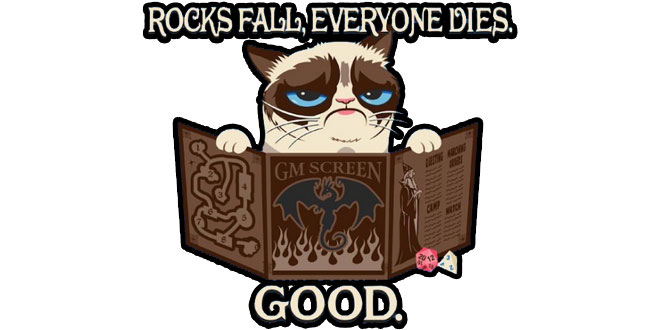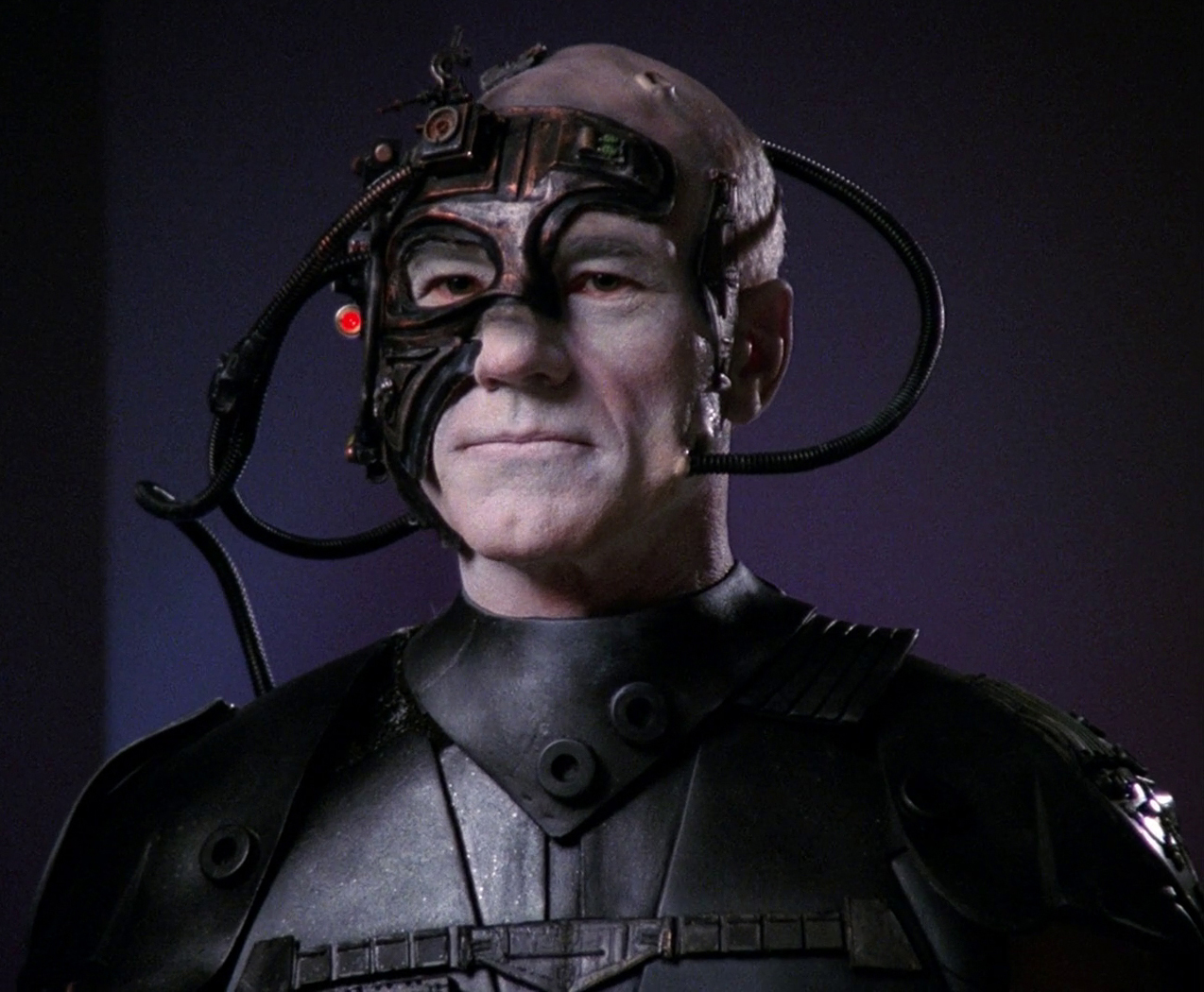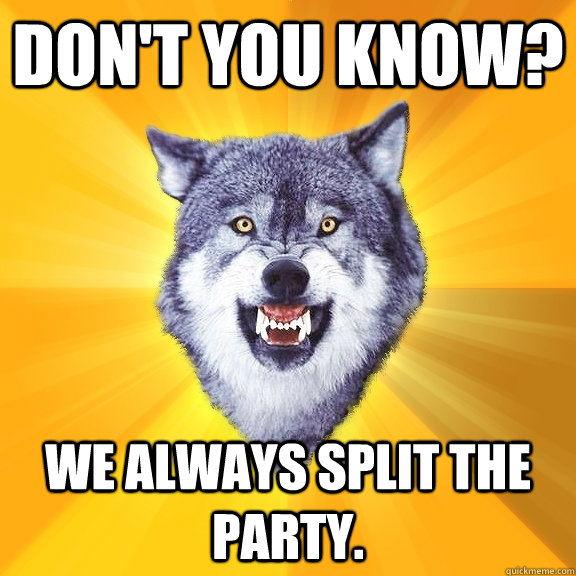I’ve been running tabletop games more or less continuously for the last five or six years, and on and off before that. I take my role as DM fairly seriously, and most of my larger campaigns are a few hundred pages’ worth of notes and reference material. A big part of that involves layers of failure– what happens if my players don’t succeed at whatever their goals are at a given time?
For all the pages of content, I wind up using about 15-20% of it. To use a recent example, I just wrapped up the first chapter of a Shadowrun game, and I think about a third of the NPCs I created for the game wound up getting used, and of those, a goodly fraction wound up appearing once and never again, not playing an important role in the game. I’m not bothered by this “wasted” work; I leave my games and the approaches my players take very open, and I rarely see a reason to force an NPC on my party if he or she doesn’t make the game more fun and align with the party’s goals. I do my best not to be a ‘railroading’ DM, and I provide story hooks but rarely explicit tunnels. At pretty much any point, my players can say “nope, not going to do that” and they’ll wind up going down some different, alternate path.
I can get away with this because I’m gifted with a group of players who aren’t actively trying to break the game world or intentionally derail the story. I can throw interesting and varied challenges at them and they’ll be taken seriously, but still approached creatively. I haven’t killed a player-character in years. I haven’t needed to, although it’s been close a few times in particularly scary combat encounters. Outside of combat, though, I don’t gun for my PCs– I generally feel like killing a player character is so trivial a job for a DM that there’s no real reason to do it except to curb game-destructive behavior.
As an example: I’m not going to kill a PC because the party forgot to disable one of ten security systems, or because a hacking attempt went badly and they got noticed, or what have you. It’s way too easy to create “gotcha” moments where something the party could never have anticipated comes out and kills them. I will cause problems if a danger they should have discovered and neutralized goes ignored, but again, I’m not killing anyone because they overlooked some detail. On the other hand, if I have a party member start openly trying to break the game or turn it into their personal playground to the detriment of people taking the game more seriously, I will and have punished that kind of destructive behavior by killing that character. At one point, I had a player (not in my usual group) make a point of cutting in and mocking every NPC the party talked to. At first, NPCs ignored this, then they started getting insulted and treating the party less well, but this didn’t curb the behavior. Eventually, they ran into a particularly powerful NPC who intended to make a deal with them. She got instantly insulted by the player, gestured once, and the player was cut down by sniper fire, at which point she turned back to the party to continue the conversation.
This brings me back to the concept of failure. I’m unlikely to kill players for failure; that’s not terribly interesting. They may be inconvenienced, but if I’m going to make a legitimately challenging encounter, I think it’s unfair of me to start killing players because dice randomness didn’t go their way in a particular session. Instead, I go down a different story path; failure is interesting, and winning all the time gets dull.
What’s interesting to me is that my current party has become highly risk-averse. In the last several games, there’s been a pretty strong reticence to take anything other than the most calculated risks, and any situation in which they might delve into the unknown leads to quick paralysis and inaction. At least in Shadowrun, I feel like the game system is oppressive enough and lethal enough that taking anything but a very carefully measured approach is very dangerous, but I’ve also seen relatively little risk-taking elsewhere. Powerful artifacts are left alone or returned to their owners, dangerous encounters are avoided rather than turned to an advantage, and moving forward without as complete knowledge as possible is rare.
I consider this a failure on my part in two ways. First, I haven’t made it clear enough that failure and death are not synonymous, and that the game will go on (and potentially be interesting with interesting hooks!) even if a particular quest or mission or fight goes badly. Second, I’ve been a little too balanced in my encounter design. I keep very careful tabs on what I know the party is capable of, and I never put them in situations that I don’t think they have a statistically significant chance of winning (75% or more). Combined with my players’ penchant for coming up with clever combos and creative solutions, I haven’t actually seen a failed encounter in quite a while now– there’s pretty much been a string of resounding successes, often well beyond what I expect.
As a result of all of this, I’ve started looking into systems that have failure as a built-in mechanic. I always look at Burning Wheel as a compelling system; it creates fantastic stories and has some really interesting character creation and advancement, but there’s a ton of crunch involved and it’s a really impenetrable and lethal system. I think a couple of my players would love it and the rest would get bogged down in the mire of rules.
I’d thought that my group disliked the new Fantasy Flight Star Wars system, which I’d always thought was a pity because it builds degrees of success and failure into the basic dice rolls in (I think) interesting ways. I found out recently that pretty much everyone is interested in getting into it, so I’m excited to give it a whirl. I think the system does a great job of making you feel like your die rolls are more than binary success/failure, and gives me a lot of interesting buttons to push and levers to pull on the DM side. On top of that, it’s not a very lethal game– even losing the entire party in combat isn’t necessarily a death sentence, unlike… pretty much every other game I’ve played.
My biggest concern is that the power level of starting characters in the system is very low. It can be hard to succeed at much of anything on your first try, and you want to work together and try to get bonuses from a variety of sources to try really difficult things. Failure is still interesting and moves things forward, but you are going to fail quite a lot, and the game will keep moving. I’m worried this is going to result in people hyperspecializing, to maximize success in a single given category, and then avoid using that skill at all if the key person who’s “good at it” isn’t around. I may have to do a bit more splitting of the party than I usually do.
That being said, the premise is interesting (force-sensitives before and during Episode IV), and I’m excited to see what kinds of characters I’ll be writing for. I have a very loose sketch of the early parts of the game, but I don’t like writing until I know what my players are playing, so I can weave their ideas into the story. I’ll have about a week to start fleshing things out, which should be enough to get a few sessions going.






That Star Wars RPG system seems really interesting and fun.
I would love to try a tabletop RPG but it’s next to impossible to find time for a regular group with the ages my kids are right now. Hopefully I’ll get a chance to in the future.